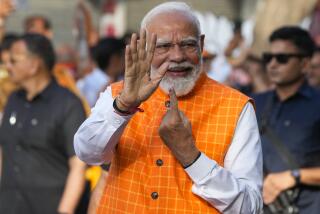Power of Symbols in India
- Share via
The president of India plays a largely ceremonial role, subordinate to the prime minister, but a smart politician can create power from symbolism. The new occupant of the office, A.P.J. Abdul Kalam, displayed that skill in picking a state torn by religious rioting for his first official visit, signaling his concern for the nation’s Muslim minority.
More than 1,000 people, most of them Muslims, were killed in riots in the western state of Gujarat in February and March. The state government did little to stop days of carnage that began as revenge after Muslims burned a train carrying Hindus back from a holy site claimed as sacred by both faiths.
Months after the riots, thousands of Muslims still live in relief camps. Thousands more are homeless and live with friends or relatives. Only when Kalam unexpectedly announced his visit did the state government, controlled by the Hindu nationalist Bharatiya Janata Party, finally make a small effort at clearing debris and whitewashing scorch marks from houses.
Kalam, 71, is the third Muslim to be president of India since the nation became independent from Britain in 1947. He has no experience in politics. His main accomplishment is spearheading India’s nuclear missile program.
A coalition of parties runs the national government, with the Bharatiya Janata Party foremost. Their leaders chose Kalam as the joint candidate of the ruling coalition in an attempt to show respect for minorities in a nation that prides itself on secularism. The opposition Congress Party’s leader also offered her endorsement.
Kalam, who was installed as president last month, visited the sites of the worst rioting. He did not stay long in most places, but he listened, asked questions and showed his concern. Fundamentalist Hindu groups that were happy to have the national hero known as the Missile Man as president complained loudly about the itinerary.
In his Independence Day speech Thursday in New Delhi, Prime Minister Atal Behari Vajpayee deplored the “horrific explosion of communal violence in Gujarat.” Indian leaders have seen such violence too often; they should prosecute those who foment it and those who carry it out. Removing Gujarat’s chief minister, who did little to stop the killings, would be a good start.
India’s Muslims constitute about 14% of the nation’s more than 1 billion people. After his visit, Kalam urged an end to religious clashes and adherence to tolerance. He is well positioned to deliver that message and should take every advantage of the platform given him.
More to Read
Sign up for Essential California
The most important California stories and recommendations in your inbox every morning.
You may occasionally receive promotional content from the Los Angeles Times.













